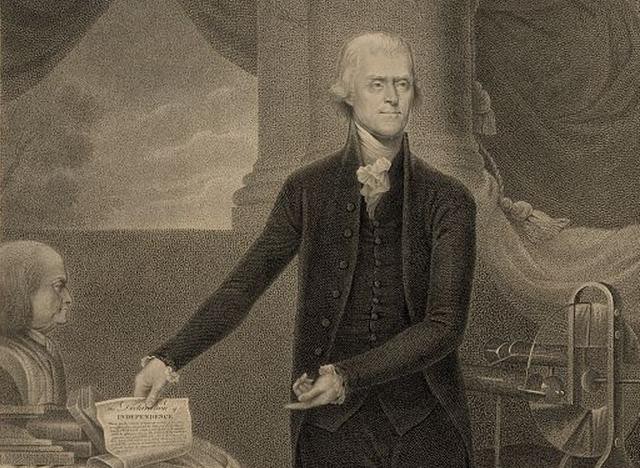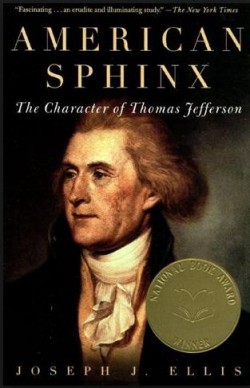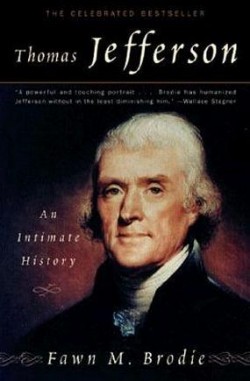The Biographies of Thomas Jefferson, International Man of Mystery
by Sarah Marshall and Amelia Laing

Sarah Marshall and Amelia Laing are reading their way through biographies of all the American presidents, in order. This time up, it’s Thomas Jefferson. Have you heard of this fellow Thomas Jefferson? He was our third President! From 1801 to 1809! And he was the father of somewhere between five and eleven children!
Amelia: Sarah Marshall left Denver this morning #lifeisterrible. We had a grand old time, though, Sarah and I. We made literally (and I do mean literally) the best bloody mary mix ever (the secret is red hot chili flakes, real grated horseradish, and three times the amount of recommended hot sauce). We were both finishing our respective Jefferson biographies and, when we weren’t watching obscene amounts of “The L Word” (it’s back on Netflix #rejoice), we reviewed Sarah and Amelia’s Presidential Year thus far.
Washington, we agreed, largely remained the enigmatic character he always has been, despite our collective 1,200-page dive into his life. We also agreed that Adams was adorably neurotic and generally underappreciated.
And Jefferson? It’s a little harder to have an opinion you can stick to with Jefferson.
Sarah: If Washington left behind too few documents that allowed us insight into his character, and Adams left behind, if anything, too many, then Jefferson leaves us with the curious problem of an endless paper trail that presents not just numerous insights into the man who created it, but insights into numerous different men. In American Sphinx: The Character of Thomas Jefferson, Joseph J. Ellis takes this revelation a step further, arguing that the various versions of Jefferson that we have created since his death have only made it more difficult to find the “real” Jefferson — if such a man could be said to exist.
Even the totemic lines of the Declaration of Independence, listing the “truths [we hold] to be self-evident,” are, to hear Ellis tell it, far more slippery than we would like to believe. Contemplating the Declaration’s truths — “that all men are created equal, that they are endowed by their Creator with certain inalienable Rights, that among these are Life, Liberty, and the pursuit of Happiness” — Ellis wonders what concrete reality these words actually promise, acknowledging that:
merely to ask the question is to risk being accused of some combination of treason and sacrilege… But when these words are stripped of the patriotic haze, read straightaway and literally, two monumental claims are made here. The explicit claim is that the individual is the sovereign unit in society…. The implicit claim is that all restrictions on this natural order are immoral transgressions, violations of what God intended…. This is a wildly idealistic message, the kind of goodness simply too good to be true. It is, truth be told, a recipe for anarchy.
It is also a recipe for contradiction. Since both the Declaration of Independence and Jefferson himself have calcified into myth (a process which occurred well within Jefferson’s own lifetime), Americans have grown accustomed to using both the document and the man to justify utterly oppositional points of view. As Ellis writes,
American citizens can come together in Jefferson’s presence and simultaneously embrace the following propositions: that abortion is a woman’s right and that an unborn child cannot be killed; that health care and a clean environment for all Americans are natural rights and that the federal bureaucracies and taxes required to implement medical and environmental programs violate individual independence; that women and blacks must not be denied their rights as citizens and that affirmative action programs violate the principle of equality.

American Sphinx: The Character of Thomas Jefferson
Describing Jefferson as “not a profound political thinker” but “an utterly brilliant political rhetorician and visionary,” Ellis sets out, in his book, to show that Jefferson’s chief contribution to the Revolution was his ability to conjure the airy ideals of what a democracy should look like. That this ideal version was indistinct enough to allow — and continue to allow — listeners to see a slightly different version, based on their own desires, dreams, and prejudices, speaks to both Jefferson’s particular genius, and his role as a creator of the American brand of political rhetoric.
Of course, these contradictions did not just become apparent after Jefferson’s death. Within his own lifetime, the paradox of his status as both America’s most prominent proponent of man’s “self-evident” right to liberty, and as the owner of roughly 200 slaves throughout his adult life, was apparent to both his contemporaries and — to an extent more difficult to plumb — himself.
Amelia: The most vocal critic of slavery out of all the Founding Fathers, Jefferson nonetheless lived “with slavery and off it,” in the words of Fawn Brodie, author of the controversial Thomas Jefferson: An Intimate History — the shot heard ‘round the world of Jefferson historiography.
Brodie, the first historian to seriously posit that Jefferson not only had a sexual relationship with his slave Sally Hemings, but that he had a 38-year relationship with her, was nailed to the wall by other historians after An Intimate History was published in 1975. Annette Gordon-Reed, author of the 1997 book Thomas Jefferson and Sally Hemings: An American Controversy, was largely influenced by Brodie’s work and wrote the introduction to the new edition. Gordon-Reed writes that Brodie’s assertion that “Jefferson ‘needed’ Hemings…drove some people to utter distraction.”
I picked An Intimate History up with some reservation; my perusals of other Jefferson biographies had left me skeptical about this much-maligned historian.
I found Brodie’s work to be thoughtful and highly readable, but what really sold me on Brodie was her treatment of the Haitian Revolution. In college, I tried to write a novel about this seminal slave uprising. The end product was laughably terrible, but I did learn a lot about the Haitian slaves’ thirteen-year struggle for freedom. It is the only successful slave revolution the world has ever known.
Called “the Pearl of the Antilles,” Saint Domingue (as it was known then) was France’s most lucrative colony, which was why in 1802 Napoleon sent thousands of soldiers there to recapture the island. The plan was to restore slavery, then reassert French interests in the New World. When Napoleon’s forces landed in Saint Domingue, they were met by yellow fever and fiercely determined ex-slaves bent on retaining their newfound freedom. Thousands of European soldiers died. The beleaguered Napoleon then abandoned his dreams of a New World empire and sold a vast amount of land to the United States: Jefferson’s Louisiana Purchase.
In most histories of France and the United States, the Haitian Revolution appears as a footnote, if it appears at all, despite its enormous influence on world events. While I enjoyed learning about Washington and Adams, I was especially excited to read about Jefferson: I was curious to see whether and how a Jefferson biography would approach the Haitian Revolution. Brodie does not disappoint: she clearly summarizes how the Haitian Revolution influenced the dialogue on slavery in the United States, and she correctly notes: “Jefferson doubtless realized what his historian Henry Adams wrote later, that the successful purchase of Louisiana at this point was in large measure due to ‘the desperate courage of 500,000 Haitian Negroes who would not be enslaved.’”
Brodie’s treatment of the Haitian Revolution highlights what makes her a powerful historian: as Gordon-Reed writes in her introduction to An Intimate History, Brodie “sent the very powerful message that the words of enslaved black people could carry equal or even greater weight than the words of the upper-class whites who enslaved them.”
Sarah: Even the Louisiana Purchase can’t be divorced entirely from Jefferson’s contradictory ideas about slavery, however — even if it did force him to recognize that “desperate courage of 500,000 Haitian Negroes.” Though, by his own admission, Jefferson fervently believed that slavery had no real future in America, he also could not imagine an America in which blacks and whites lived freely, side by side: such an arrangement could only result, he claimed, in “convulsions which will probably never end but in the extermination of one or the other race.” Contemporaries with a more sanguine outlook on the issue failed to provide much help. David Ramsay, a South Carolina historian, wrote: “in a few centuries the negroes will lose their black color. I think now they are less black in Jersey than in Carolina.” Once blacks were white, then, slavery could presumably be abolished without fear of a resulting race war, since there would be only one race left in America — as biology presumably intended.
Those — Jefferson included — who took a less passively oblivious view of the problem still found themselves unable, or unwilling, to arrive at a real solution. To Jefferson, however, the Louisiana Purchase represented not just a chance to expand the country, but a chance to force all America’s problems somewhere “out west,” far away from the nation’s population centers, and where slavery, racial tensions and a host of other problems could be solved on the frontier, somewhere in the indeterminable future. If slavery could be prohibited in the new territories out west — which Jefferson regarded as an almost foregone conclusion, as evidenced by his later response to the Missouri Question — then slavery would gradually melt away, in part due to Jefferson’s timely purchase. In this way he could, perhaps, feel he had done his part in ending slavery. If there were also mammoths out there — as Jefferson guessed — then so much the better.

Thomas Jefferson: An Intimate History
Amelia: Brodie was often the only reason other Jefferson historians even mentioned Hemings. Both Willard Sterne Randall and Noble E. Cunningham Jr., (authors of Thomas Jefferson: A Life (1993) and In Pursuit of Reason: The Life of Thomas Jefferson (1987) respectively) are adamantly dismissive of Brodie’s work: Sterne Randall writes that Brodie “dusted off a highly inaccurate and uncorroborated memoir by a man who described himself as Madison Jefferson, son of Jefferson and Sally Hemings.” His disbelief continues: “Also offered as evidence by Brodie… are descriptions of a host of mulattoes at Monticello who resembled Jefferson, and a declaration that one even played the fiddle!”
Cunningham Jr. expresses the same incredulity: “The defects of Brodie’s work having been fully examined elsewhere, it is unnecessary to dwell upon them here. The evidence indicates that any… romance between Jefferson and Sally Hemings belongs in a work of fiction, not of history.”
There were definitely parts of An Intimate History that I didn’t like. Brodie, in an attempt to marry history and psychology, tries to put Jefferson on a therapist’s couch. Of Sally Hemings, Brodie writes, “Since her own father John Wayles had died in the year of her birth, Jefferson was perhaps as close to being a parental figure as anyone she had ever known.” While I was put off, Brodie doesn’t covertly hide her opinions about her subject under the guise of objectivity, and I could appreciate the framework within which she worked while disagreeing with some of her views.
Brodie, often labeled as one of Jefferson’s most prominent historical detractors, is actually almost too forgiving in her treatment of the third president. Brodie loved her subject, and this love shows from beginning to end: “He was a man richly endowed with warmth and passion but trapped in a society which savagely punished miscegenation, a man, moreover, whose psychic fate it was to fall in love with the forbidden woman. The fault, it can be held, lay not in Jefferson but in the society which condemned him to secrecy.”
An ex-girlfriend of mine once told me that true admiration means nothing without criticism. Brodie admired Jefferson, despite his hypocrisy, and I admire Brodie despite her Freudian influence. It’s too bad that reviewers, including myself, usually only concentrate on the Sally Hemings component of An Intimate History; the multi-faceted biography offers a refreshing view on many aspects of Jefferson’s personal and political life.
For example: One of my favorite parts of An Intimate History comes when Brodie explores Jefferson’s idea that “the earth belongs to the living,” an idea that he first mentioned in a letter to James Madison. After Jefferson’s travels to Europe, where he saw “a living testament to the truth that the world belonged not to the living but to the dead, who continued inexorably to bind the living in chains of ancient law, religious ritual, social protocol, and sexual prohibition,” Jefferson came to believe that “no nation should have the right to bind a new generation by public debts.” He also suggested that a permanent legislative program that provided “no new laws, constitutions, or financial contracts be drawn up that would last more than a generation, which he defined as nineteen years.”
Sarah: The so-called “Sally Question” is one that Ellis deals with only briefly, in a short appendix to the book — and another page-long addition, tacked on when DNA tests suggesting that Jefferson almost certainly fathered at least one of Hemings’ children were made public shortly after the book’s first printing. That Ellis fails to pay much attention to the question does not diminish the value of his study: throughout his scrupulously argued work, Ellis paints a picture of a Jefferson we can readily see both drafting the Declaration of Independence and fathering children with a slave. That a man of such powerful convictions could also embody such stark contradictions is, Ellis argues, the result of self-deception and lifelong equivocation as much as it is of anything else.
What, then, Ellis asks us, are we to make of a man who sometimes hardly knew what to make of himself? In this case, the answer is the same as when we contemplate the totemic Jefferson: we can make whatever we wish of him. Certainly many have.
Amelia: Fawn Brodie died in 1981 at the age of 65 and didn’t live to see the publication of Gordon-Reed’s Thomas Jefferson and Sally Hemings: An American Controversy, a book where Gordon-Reed, a Harvard law professor, “drew on her legal training to apply context and reasonable interpretation to the sparse documentation” to explore a history free of the common assumptions that historians, past and present, are prone to make; namely, that white people and slave-owners tell the truth, and that black people and slaves lie.
Brodie also missed the results of the 1998 DNA study that linked the Jefferson line to the Hemings line. While not proof that Jefferson fathered Hemings’ children, these findings prompted the Smithsonian Institution, in conjunction with The Thomas Jefferson Foundation, to create an exhibit: “Slavery at Jefferson’s Monticello: The Paradox of Liberty.” Today, many historians agree that Jefferson probably fathered Hemings’ children. The nature of their relationship, however, remains unknowable. The Thomas Jefferson Heritage Society stoutly refuses to credit the possibility; no surprise, really, as their mission statement reads: “To stand always in opposition to those who would seek to undermine the integrity of Thomas Jefferson.”
We’ll probably never know with absolute certainty whether Jefferson fathered Hemings’ children. We do know that slave owners often impregnated their slaves. What made An Intimate History so controversial was the fact that Brodie had the gall to connect this reality with one of the Founding Fathers, the author of our beloved Declaration of Independence, no less.
An Intimate History is not just about whether or not Jefferson fathered Hemings’ children; it’s about power and the production of history. The conversation that followed the publication showed Americans how we perceive ourselves. While the nature of Jefferson and Hemings’ probable relationship will most likely never be known, the way we have written and rewritten their story says so much about “we the people,” then and now.
Read Joseph J. Ellis’ American Sphinx: The Character of Thomas Jefferson if…
you want insight into key intervals in Jefferson’s life, and want to see a clear-sighted and critical view of him — albeit one that’s a bit too lax on the “Sally Question.”
Read Fawn Brodie’s Thomas Jefferson: An Intimate History if…
you want to understand the historical conversation surrounding Jefferson’s life as a whole: the public and the private.
Up Next: Richard Labunski’s James Madison and the Struggle for the Bill of Rights and Kevin R. C. Gutzman’s James Madison and the Making of America.
Sarah Marshall and Amelia Laing are planning a trip to Monticello.
